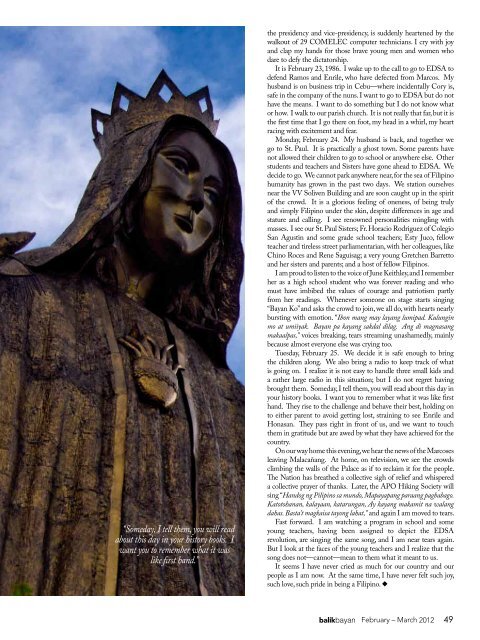Te - Balikbayan Magazine
Te - Balikbayan Magazine
Te - Balikbayan Magazine
Create successful ePaper yourself
Turn your PDF publications into a flip-book with our unique Google optimized e-Paper software.
“Someday, I tell them, you will read<br />
about this day in your history books. I<br />
want you to remember what it was<br />
like rst hand.”<br />
the presidency and vice-presidency, is suddenly heartened by the<br />
walkout of 29 COMELEC computer technicians. I cry with joy<br />
and clap my hands for those brave young men and women who<br />
dare to defy the dictatorship.<br />
It is February 23, 1986. I wake up to the call to go to EDSA to<br />
defend Ramos and Enrile, who have defected from Marcos. My<br />
husband is on business trip in Cebu—where incidentally Cory is,<br />
safe in the company of the nuns. I want to go to EDSA but do not<br />
have the means. I want to do something but I do not know what<br />
or how. I walk to our parish church. It is not really that far, but it is<br />
the rst time that I go there on foot, my head in a whirl, my heart<br />
racing with excitement and fear.<br />
Monday, February 24. My husband is back, and together we<br />
go to St. Paul. It is practically a ghost town. Some parents have<br />
not allowed their children to go to school or anywhere else. Other<br />
students and teachers and Sisters have gone ahead to EDSA. We<br />
decide to go. We cannot park anywhere near, for the sea of Filipino<br />
humanity has grown in the past two days. We station ourselves<br />
near the VV Soliven Building and are soon caught up in the spirit<br />
of the crowd. It is a glorious feeling of oneness, of being truly<br />
and simply Filipino under the skin, despite dierences in age and<br />
stature and calling. I see renowned personalities mingling with<br />
masses. I see our St. Paul Sisters; Fr. Horacio Rodriguez of Colegio<br />
San Agustin and some grade school teachers; Esty Juco, fellow<br />
teacher and tireless street parliamentarian, with her colleagues, like<br />
Chino Roces and Rene Saguisag; a very young Gretchen Barretto<br />
and her sisters and parents; and a host of fellow Filipinos.<br />
I am proud to listen to the voice of June Keithley, and I remember<br />
her as a high school student who was forever reading and who<br />
must have imbibed the values of courage and patriotism partly<br />
from her readings. Whenever someone on stage starts singing<br />
“Bayan Ko” and asks the crowd to join, we all do, with hearts nearly<br />
bursting with emotion. “Ibon mang may layang lumipad. Kulungin<br />
mo at umiiyak. Bayan pa kayang sakdal dilag. Ang di magnasang<br />
makaalpas,” voices breaking, tears streaming unashamedly, mainly<br />
because almost everyone else was crying too.<br />
Tuesday, February 25. We decide it is safe enough to bring<br />
the children along. We also bring a radio to keep track of what<br />
is going on. I realize it is not easy to handle three small kids and<br />
a rather large radio in this situation; but I do not regret having<br />
brought them. Someday, I tell them, you will read about this day in<br />
your history books. I want you to remember what it was like rst<br />
hand. ey rise to the challenge and behave their best, holding on<br />
to either parent to avoid getting lost, straining to see Enrile and<br />
Honasan. ey pass right in front of us, and we want to touch<br />
them in gratitude but are awed by what they have achieved for the<br />
country.<br />
On our way home this evening, we hear the news of the Marcoses<br />
leaving Malacañang. At home, on television, we see the crowds<br />
climbing the walls of the Palace as if to reclaim it for the people.<br />
e Nation has breathed a collective sigh of relief and whispered<br />
a collective prayer of thanks. Later, the APO Hiking Society will<br />
sing “Handog ng Pilipino sa mundo, Mapayapang paraang pagbabago.<br />
Katotohanan, kalayaan, katarungan, Ay kayang makamit na walang<br />
dahas. Basta’t magkaisa tayong lahat,” and again I am moved to tears.<br />
Fast forward. I am watching a program in school and some<br />
young teachers, having been assigned to depict the EDSA<br />
revolution, are singing the same song, and I am near tears again.<br />
But I look at the faces of the young teachers and I realize that the<br />
song does not—cannot—mean to them what it meant to us.<br />
It seems I have never cried as much for our country and our<br />
people as I am now. At the same time, I have never felt such joy,<br />
such love, such pride in being a Filipino. <br />
balikbayan February – March 2012 49


